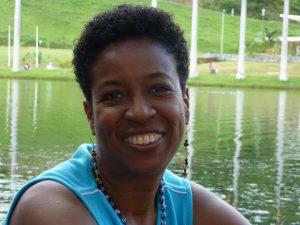
Office Location:
Specialization:
African Diaspora, Colonial Latin America and the Caribbean
Education:
Bio:
I am a historian of the African Diaspora in Colonial Latin America and the Caribbean. I am a Venezuelan of Haitian descent. By now I am a person shaped by larger worlds: I have lived for years in the Northeast of the United States and, before that, I spent two years in Socialist Eastern Europe and West Africa respectively. My first profession and interest, conservation biology, brought me to the U.S. and later took me to Cameroon, where I came across the roots of several Venezuelan and Latin American cultural elements. I began to question silenced African contributions to the hemisphere.
In Philadelphia, I created the Annual Arturo Schomburg Symposium (going to its 21st consecutive year), at Taller Puertorriqueño, Inc.http://tallerpr.org/event/20th-arturo-schomburg-symposium/. This event brings together scholars, professionals, activists, and artists to share their expertise about African contributions to Latina/o and Latin American history and cultures with a wide audience. My thirst for understanding Latin America’s racialization processes and the ways these have shaped power dynamics in the region, since the colonial period, led me to fall in love with the discipline of history.f the African Diaspora in Colonial Latin America and the Caribbean. I am a Venezuelan of Haitian descent. By now I am a person shaped by larger worlds: I have lived for years in the Northeast of the United States and, before that, I spent two years in Socialist Eastern Europe and West Africa respectively. My first profession and interest, conservation biology, brought me to the U.S. and later took me to Cameroon, where I came across the roots of several Venezuelan and Latin American cultural elements. I began to question silenced African contributions to the hemisphere.
In Philadelphia, I created the Annual Arturo Schomburg Symposium (going to its 21st consecutive year), at Taller Puertorriqueño, Inc.http://tallerpr.org/event/20th-arturo-schomburg-symposium/. This event brings together scholars, professionals, activists, and artists to share their expertise about African contributions to Latina/o and Latin American history and cultures with a wide audience. My thirst for understanding Latin America’s racialization processes and the ways these have shaped power dynamics in the region, since the colonial period, led me to fall in love with the discipline of history.
Research:
More broadly I am interested in:
- The construction of hegemonic narratives across time and the role these play in shaping the “social order”
- Inherent and inherited systemic overt and hidden forms of violence
- The intersectionality of “Honor,” Race, Gender, Class
- Our responsibility as Social Historians to Public History, Activism, and Social Change
Projects:
My current research focuses on identities and political consciousness among Africans and their descendants during the colonial period. I document the ways their agency contributed to political debates in the Province of Caracas. By the end of the eighteenth-century, people of African descent (most of them free) represented the majority of the population, and although this was a peripheral region through most of the colonial period, at least from the perspective of the Spanish Crown, it has been described as “the only mainland region in Spanish America where slave plantations developed an export trade to Europe (and the Americas) on any scale.”
I am currently working on various articles and a book manuscript about “Black Honor.” This project examines the ways Afro-descendants perceived their identities, contested the idea that they had no honor, and, by the turn of the nineteenth-century were shaping modern ideas of rights, freedom, citizenship, and equality.
Publications:
In Press. Author/Essayist, “Esclavizadas, cimarronaje y la Ley en Venezuela, 1760-1809” in Demando Mi Libertad; Relatos de mujeres Negras y sus estrategias de resistencia en Nueva Granada, Venezuela y Cuba. Sponsored by the Eight Cycle of FORD/LASA Special Projects. Universidad Icesi, Cali-Colombia.
Nov. 2015. Book Review, Ann Twinam, “Purchasing Whiteness: Pardos, Mulattos, and the Quest for Social Mobility in the Spanish Indies.” Stanford, CA: Stanford University Press. 2015. E.I.A.L (Estudios Interdisciplinarios de América Latina y el Caribe) Instituto Sverdlin de Historia y Cultura de América Latina, Tel Aviv University.
2014. Author/Essayist, “Debates públicos de la afrodescendencia hacia el fin de la colonia.” In Memorias 1er Foro Internacional de Afrodesendencia y Descolonización de la Memoria. Homenaje a Juan José Rondón. (August 2012). Caracas: Ministerio del Poder Popular para la Cultura – Fundación Centro Nacional de Historia – Archivo General de la Nación. Caracas, Venezuela.
2010. Author/Essayist, “Invoking Arturo Schomburg’s Legacy in Philadelphia,” in The Afro-Latin@ Reader, History and Culture in the United States. Eds. Miriam Jimenez-Román and Juan Flores. Duke University Press. Durham, NC.
2011. Author/Essayist, “A Life’s Spiral: Journeys of an Afro-Latina Activist,” in Women Warriors of the Afro-Latina Diaspora. Eds. Marta Moreno Vega, Marinives Alba, Yvette Modestin. Arte Público Press, Houston, TX.
Courses:
- Introduction to the History of the African Diaspora, 1480s – present
- Race, Gender, and Class in the Americas, 1490s – present
- Blackness, Agency, and Ideologies, 1490s – present
- Honor, Sexuality, Patriarchy, and Citizenship in the Americas, from the colonial period to the present
- Introduction to Iberian, Latino, and Latin American Studies
- Survey Course: History Colonial Latin America, 1490s – 1820s
- Areas Studies: Introduction to Africa, 1480s to the present
